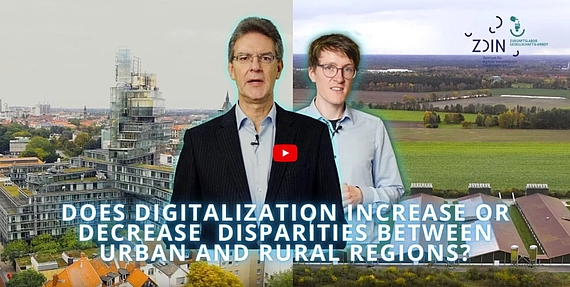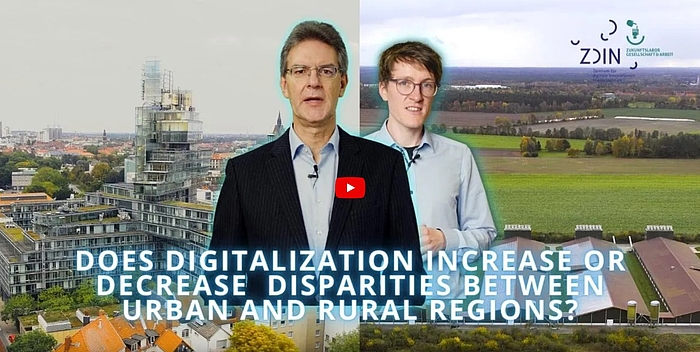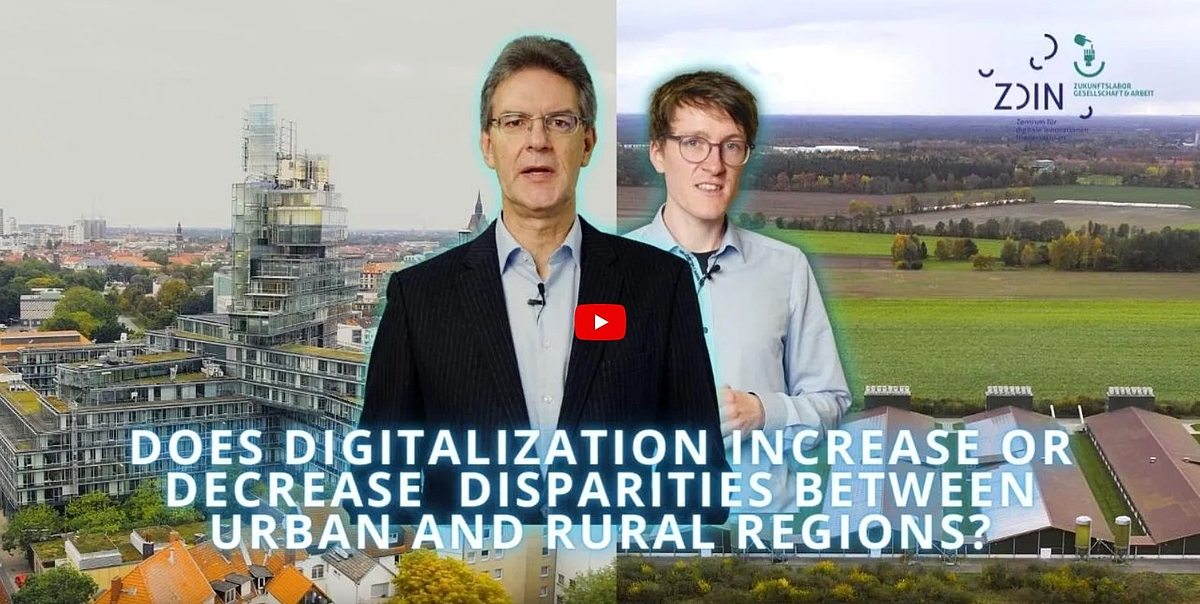The spatial effects of digitalisation and its regional and spatial planning policy implications

| Led by: | Prof. Dr. Rolf Sternberg |
| Team: | Lukas Häfner |
| Year: | 2019 |
| Funding: | Niedersächsisches Ministerium für Wissenschaft und Kultur (MWK) aus Mitteln des Niedersächsischen Vorab der VolkswagenStiftung |
| Duration: | 2019 - 2025 |



Digitalisation offers new opportunities for the population and companies in rural areas, because the Internet and other digital technologies are making spatial distances less important - according to a well-known thesis from the early years of digitalisation. This thesis is experiencing a revival in the debate about "left behind" regions and the large differences in regional living conditions, especially between rural and urban areas. Thus, the expansion of the Internet infrastructure in hitherto underserved, predominantly rural regions is also taking place with the hope that these regions could catch up economically to urban regions. This could be achieved by enhancing them as residential locations, encouraging business start-ups or opening up new opportunities for established companies.
While recent research suggests that digitalisation might be an important factor in counteracting rural migration, it is more controversial whether digitalisation offers more (new) opportunities for start-ups and established companies in rural areas than in urban ones. There are many counterarguments to the thesis mentioned above, and since digitalisation opens up a wealth of urban-centred innovation opportunities, it could even lead to an increase in the differences. So far, empirical studies have come to inconsistent results on whether digitalisation can help rural areas catching up with the urban economy. However, there is agreement in previous research results that it is not the existence of the infrastructure, but the nature of the use of digital technologies that is crucial for regional effects. Crucial for their use, in turn, are the regional attitudes and digital skills of the population and the workforce in the companies. Thus, digital skills are a key component of regional human capital in times of digitalisation. The regional distribution and regional variations in the significance of individual aspects of these skills has so far been largely unexplored.
The aim of the research project is to capture and analyse digital skills in companies, especially with regard to business start-ups, by means of qualitative and quantitative methods in a regional comparative way. In this way, the research project aims at contributing to a better understanding of regional opportunities and risks of digitalisation. Thus, an assessment is to be given of the influence digitalisation has on the development of different types of regions and thus on the development of regional (economic) disparities. The findings from the research project are intended to help decision-makers in politics, administration and companies to shape the rapid digital transformation towards socially desirable goals, for example by the targeted strengthening of rural regions. The past has clearly shown that political measures have to go beyond the expansion of the digital internet infrastructure and have to focus in particular on regional competencies. Findings on how these competencies should be developed in a regionally differentiated manner are therefore a central goal of the research project and should enable concrete proposals for regional, start-up and economic policy in order to shape digitalisation according to desired outcomes.
The research project is part of the future lab for Society and Work (Zukunftslabor Gesellschaft und Arbeit) in the Centre for Digital Innovations Lower Saxony (Zentrum für digitale Innovationen Niedersachsen). Researchers from various disciplines cooperate in the future lab to shed light on the effects of digitalisation on forms of work and employment as well as the future organisation of the society and to provide help for its implementation. In addition to economic geography, representatives of computer science and legal informatics, communication management, cultural studies, sociology and economics are represented in the future lab.
Publications
- Knuepling, L.; Sternberg, R; Otto, A. (2025): Rural areas as winners of COVID-19, digitalization and remote working? Empirical evidence from recent internal migration in Germany. Cambridge Journal of Regions, Economy and Society 18(1), 227–248. DOI: 10.1093/cjres/rsae033
- Altendorf, A.; Fazlija, D.; Häfner, L.; Illing, J.; Konrad, K.; Malczok, M.; Zühlke, M. (2024): Handbuch Wissenschaftskommunikation - Ein praxisorientierter Einstieg.
- Bergholz, C.; Füner, L.; Lubczyk, M.; Sternberg, R.; Bersch, J. (2024): Infrastructure required, skill needed: Digital entrepreneurship in rural and urban areas. Journal of Business Venturing Insights 22, e004288. DOI: 10.1016/j.jbvi.2024.e00488
- Häfner, L.; Sternberg, R. (2024): Gibt es einen räumlichen Digital Divide auch in Niedersachsen - und wie könnte dieser verringert werden? Neues Archiv für Niedersachsen 11(1), 19-36. DOI: 10.5571/0342-1511-2024-1-19
- Thonipara, A.; Sternberg, R.; Proeger, T.; Häfner, L. (2023): Digital divide, craft firms’ websites and urban-rural disparities—empirical evidence from a web-scraping. Review of Regional Research 43, 69-99. DOI: 10.1007/s10037-022-00170-5
- Haefner, L.; Sternberg, R. (2020): Spatial implications of digitization: State of the field and research agenda. Geography Compass 14(12), e12544. DOI: 10.1111/gec3.12544
- Thonipara, A.; Sternberg, R.; Proeger, T. & Haefner, L. (2020): Assessing the 'Digital Divide' and its Regional Determinants: Evidence from a Web-Scraping Analysis. ifh Working Papers (No. 25). Göttingen.
Presentations to Scientific Audiences
- Sternberg, R.; Bizer, K.; Heinze, C.: Digitalisierung der niedersächsischen Wirtschaft – woran hakt es in der Politik? Abschlusssymposium des Zukunftslabors „Gesellschaft und Arbeit“ des Zentrums für digitale Innovationen Niedersachsen (ZDIN). Hannover, 28.1.2025.
- Knüpling, L.; Sternberg, R.; Otto, A.: Migration of the Highly Qualified: Positive Effects for Rural Areas from Digitalization, Working from Home and COVID19? 7th Geography of Innovation Conference, University of Manchester. Manchester/UK, 12.1.2024.
- Kagel, A.-S.; Haefner, L.: Digitalization in the Periphery - A Promising Opportunity for Economic Renewal? 7th Geography of Innovation Conference. Manchester, 11.01.2024.
- Sternberg, R.; Knüpling, L.; Otto, A.: Rural areas as winners of the COVID19 pandemic? Digitalisation, working-from-home and the internal migration of the highly qualified. Global Crises, Mega Trends and Regional Development, St Catharine’s College. Cambridge/UK, 12.7.2023.
- Haefner, L.: Rural companies and the development of digital solutions: Rural digital transformations on their way? 3rd European Rural Geographies Conference, Groningen, 29.06.2023.
- Sternberg, R.; Knüpling, L.; Otto, A.: Binnenmigration von Hochqualifizierten: Positive Effekte für ländliche Räume durch Digitalisierung, Home‐Office und COVID19?. 16. Rauischholzhausener Symposium zur Wirtschaftsgeographie. Rauischholzhausen 27.-29.4. 2023.
- Haefner, L.: Firms’ access to external knowledge for digitalization: Identifying types of networks in diverse rural and urban regions. IIDEOS Colloquium, Marburg, 20.02.2023.
- Sternberg, R.; Bergholz, C.; Bersch, J.; Füner, L.; Lubczyk, M.: Does access to digital infrastructure lead to a shift of digital new firms in favor of rural regions? 61st ERSA Conference. Pécs (Ungarn), 25.8.2022.
- Sternberg, R.; Knüpling, L.: On the spatiality of digitalization: Migration of the highly-skilled and interregional disparities. 61st ERSA Conference. Pécs (Ungarn), 24.8.2022.
- Haefner, L.: Regional digital competences and their role in shaping the economic implications of digitalization. 61st ERSA Congress. Pécs (Ungarn), 24.08.2022.
- Sternberg, R.; Knüpling, L.: High-speed internet vs. locational preferences of the highly-skilled: Will improved digital infrastructure lead to a decrease of economic disparities between urban and rural areas? 6th Geography of Innovation Conference, Bocconi University. Mailand (Italien), 6.7.2022.
- Sternberg, R.: Automation, Digitalisation and AI: A Roadmap for Regions. Contribution to the OECD Roundtable. 6th Geography of Innovation Conference, Bocconi University. Mailand (Italien), 6.7.2022.
- Häfner, L.: Internetversorgung, Digitalisierung und die Gleichwertigkeit der Lebensverhältnisse. November der Wissenschaft, Hannover, 05.11.2021.
- Häfner, L.: Digitalization and interregional Inequality. ZDIN Zukunftslabor Gesellschaft und Arbeit Autumn School, Hannover, 21.10.2021.
- Sternberg, R.: Zu den regionalökonomischen Implikationen der Digitalisierung: Death of Distance und/oder Zunahme interregionaler Disparitäten?" Gastvortrag am Schweizerischen Institut für KMU und Unternehmertum der Universität St. Gallen. St. Gallen (Schweiz) am 16.8.2021.
- Sternberg, R.: "Digital Divide" - Digitalisierung und regionale Ökonomien. Volkswirteforum des ifh Göttingen. Göttingen. 21.09.2020.
- Sternberg, R.: Digitalization, entrepreneurship and regional disparities - Implications for economic geography and regional policy. Spring School, Zentrum für digitale Innovationen Niedersachsen (ZDIN), Zukunftslabor Gesellschaft und Arbeit. Hannover. 10.09.2020.
- Häfner, L.: Digitalisation, spatial (in-)equality and innovation-based regional development: state of the art and research agenda. 5th Geography of Innovation Conference, Stavanger, Norway, 31.01.2020.
- Häfner, L.: Digitalisation, spatial (in-)equality and innovation-based regional development: state of the art and research agenda. IIDEOS Colloquium, Hannover, 24.01.2020.
Non-scientific Events
- Haefner, L.: Vergrößert oder verkleinert Digitalisierung die Stadt-Land-Unterschiede? Dritter bundesweiter Digitaltag. Hannover, 24.06.2022.
- Häfner, L.: Moderation einer Veranstaltung zum Thema „Cross Innovation mit der Kreativwirtschaft“ bei den SNIC Innovationstagen 2021, 26.01.2021.
- Häfner, L.: Online Workshop zum Thema „Wirtschaftspolitik und regulatorischer Rahmen“ im Rahmen der ZDIN-Workshopreihe, 28.06.2021.
- Häfner, L.: Vortrag zum Thema „Digitalisierung, Breitbandausbau und der ländliche Raum“ Online Veranstaltung der Konrad-Adenauer-Stiftung beim Hermann-Ehlers-Bildungsforum Weser-Ems, 15.06.2021.


